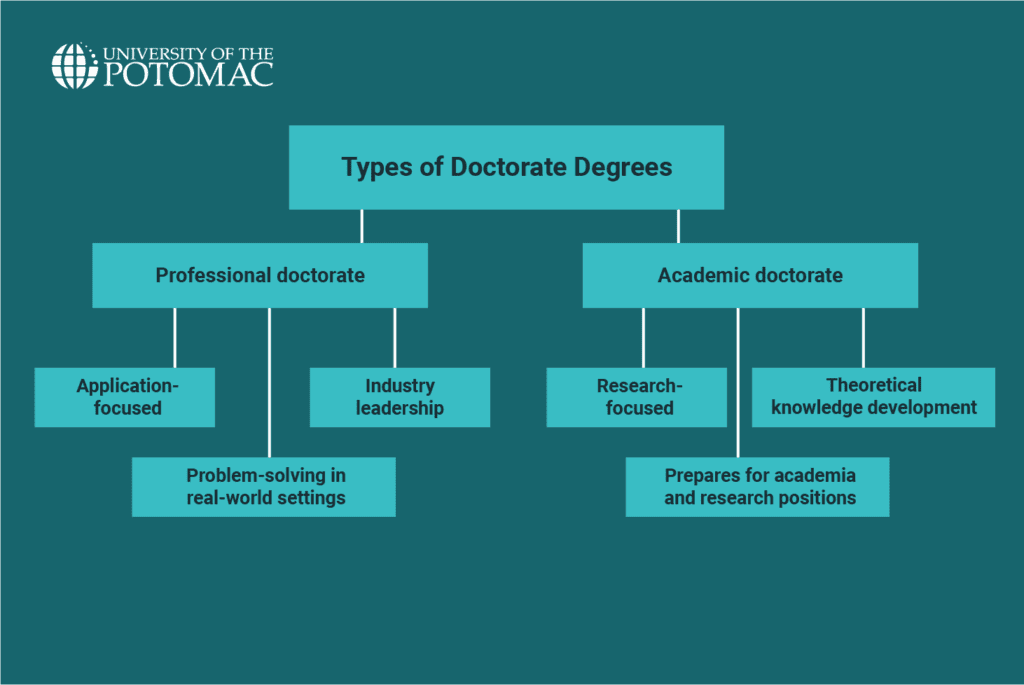Key Takeaways
- A doctorate is the highest level of education, helping people become experts and qualify for top jobs.
- There are two main types of doctorates: academic and professional.
- Earning a doctorate requires significant time, effort, and financial investment.
- The average time to complete a PhD is around 7 years, while professional doctorates (MD, JD, DBA, etc.) typically take 3–5 years.
Have you ever wondered what it takes to become a true expert in your field? A doctorate degree is the highest academic achievement that can equip you with expert knowledge and opens doors to top careers in teaching, research, leadership, and specialized industry roles.
However, earning a doctorate degree takes years of dedication, hard work, and financial investment, so it’s crucial to consider your long-term career goals before deciding to pursue one.
What Is a Doctorate Degree?
A doctorate or doctoral degree is a postgraduate degree awarded by universities and other similar academic institutions. This degree is the highest academic qualification in a profession or field. Thus, a doctorate requires years of focused study and hard work, which ends with a dissertation or capstone project contributing new knowledge to the field.
Earning a doctorate degree equips you with specialized knowledge and skills that can open doors to higher-level positions in academia, research, and industry. In addition, doctorate degree holders enjoy the prestige of being experts in their field, have higher earning potential, and have the ability to shape their fields through research, teaching, or professional practice.
Types of Doctorate Degrees

There are two main types of doctorate degrees: professional and academic. The type you choose depends on the field you want to study, but both of them are terminal degrees, i.e., the highest degree you can earn in that particular field.
Professional doctorate
A professional doctorate, also known as an applied doctorate, is designed for experts seeking advanced, career-focused knowledge in fields like medicine, law, and business. Unlike research-focused doctorates, these programs emphasize practical application, equipping students with specialized skills to tackle real-world challenges and drive innovation in professional settings.
Examples of professional doctorates include:
- Doctor of Education (EdD)
- Doctor of Business Administration (DBA)
- Doctor of Chiropractic (DC)
- Doctor of Dental Medicine (DMD)
- Doctor of Dental Surgery (DDS)
- Doctor of Podiatric Medicine (DPM)
- Doctor of Veterinary Medicine (DVM)
- Juris Doctor (JD)
Academic doctorate
A PhD (Doctor of Philosophy), often referred to as an academic doctorate, is a terminal degree that emphasizes original research and typically requires a dissertation. While many PhD graduates pursue careers in academia as professors or researchers, the expertise gained—critical thinking, data analysis, and problem-solving—can also be applied in industries such as consulting, policy-making, government, and private sector leadership.
Examples of academic doctorates include:
- Doctor of Philosophy (PhD)
- Doctor of Design (DDes)
- Doctor of Fine Arts (DFA)
- Doctor of Theology (ThD)
How to Get a Doctorate Degree
Academic or professional, earning a doctoral degree can be challenging and requires a lot of hard work and dedication. It all begins with meeting the necessary requirements and applying to a doctorate program.
To apply and get accepted into a doctorate program, you’ll first need to obtain a bachelor’s and usually (but not always) a master’s degree in a relevant field. After that, you need to prepare your application for the doctorate degree program of your choice.
A strong academic record, a well-crafted CV, letters of recommendation, and a statement of purpose are typically required for an application to a doctoral program. In addition, some programs require taking an entrance exam like GRE or GMAT. Lastly, research experience and published work can strengthen your application and increase your chances of getting accepted into a doctoral program.
When enrolled in a doctoral program, you’ll go through a few stages of education. The first stage emphasizes advanced coursework that will equip you with the knowledge and skills you’ll need in your chosen field. The coursework may last one to three years, depending on the program. Once you’re finished with the coursework, you’ll have to pass your exams. The last and most important stage is conducting original research, concluding with a doctoral dissertation or capstone project.
How Long Does It Take to Get a Doctorate Degree?

The time it takes you to get a doctorate degree depends on a few factors, like the program’s requirements, your field of study, and other personal circumstances. However, it takes students an average of 7.3 years after starting graduate school to obtain a doctoral degree.
PhD programs that focus on research and academia typically last five to seven years, while professional doctorates like a DBA may require less time (three to five years).
Another factor that affects this timeline is the pace of study, with full-time students naturally obtaining their degree faster than part-time students who balance studies and work or other personal commitments.
Lastly, the institutional requirements, program structure, and complexity of your dissertation can all impact how long it takes for you to graduate.
Demand and Salary Expectations
As there is an almost constant need for experts with advanced knowledge in various fields, the demand for doctoral degrees has increased steadily over the years. With industries becoming more complex and technology advancing, companies and organizations are always on the lookout for professionals who can help solve their problems, drive innovation, and lead research.
Interested in pursuing a degree?
Fill out the form and get all admission information you need regarding your chosen program.
This will only take a moment.
Message Received!
Thank you for reaching out to us. We will review your message and get right back to you within 24 hours.
If there is an urgent matter and you need to speak to someone immediately you can call at the following phone number:
- We value your privacy.
According to the Bureau of Labor Statistics, employment for doctoral-level occupations is expected to grow by about 13%. Meanwhile, the average annual salary for a doctorate holder can go as high as $398,000, depending on the field.
While high demand in certain professions often leads to better compensation, that’s not the only factor. A doctoral degree is an advanced degree and, as such, equips you with the knowledge and skills that others with a bachelor’s and master’s might not have. This expertise has become increasingly valuable in industries like healthcare, business, and engineering in recent years.
Additionally, doctorate holders frequently qualify for senior-level positions that offer greater responsibility, decision-making power, and, naturally, higher salaries.
Is a Doctorate Degree Right For You?
Pursuing a doctorate degree is a significant academic and professional milestone, but it’s not the right path for everyone. The ‘perfect’ candidate for a doctorate is someone who is passionate about their field, enjoys research, and is committed to long-term academic and professional growth.
A doctorate degree can be the right choice if you want to become a professor, researcher, industry expert, or a high-level leader in a field like education, business, healthcare, and technology.
However, before making the decision, it’s important to consider the time commitment, financial costs, career goals, and job market demands for your profession. As earning such a degree requires a significant investment in terms of time and money, it’s wise to make sure it aligns with your long-term career goals.
People usually pursue a doctorate for the various benefits it brings, such as higher earning potential, career advancement, and expertise in the field. On top of opening doors to leadership roles, a doctorate degree also increases job stability and gives you the opportunity to contribute to your field through research.
So, if you’re motivated enough and think you can take on the challenge, a doctorate degree can be a valuable investment for your future career.
The Bottom Line
A doctorate degree, whether professional or academic, is the highest level of education and helps people become experts in their field. A terminal degree can be highly beneficial as it often leads to competitive earning potential, higher-level positions, and job security.
Although there is an increasing demand for doctorate holders, earning one requires time and hard work, and it’s not for everyone. Nonetheless, if you’re interested in being a leader in your field, solving problems, leading research, and are up for the challenge, a doctorate degree can be very valuable for your career.
Check out the doctoral programs at Potomac today and start your journey toward a brighter future!
Frequently Asked Questions (FAQs)
How rare is a doctorate degree?
Only about 2% of the world’s population holds a doctorate degree, making it a rare and highly respected achievement.
What comes after a doctoral degree?
A doctorate degree is the highest academic degree, but postdoctoral research and honorary degrees may follow.
How much is a doctorate degree worth?
The value of a doctorate degree depends on factors such as field of study, career goals, earning potential, and industry demand. While it requires a significant investment of time, effort, and money, the long-term benefits can be substantial.
What do you call someone with a doctorate degree?
They are called “Doctor” (Dr.), followed by their name, especially in academic and professional settings.










